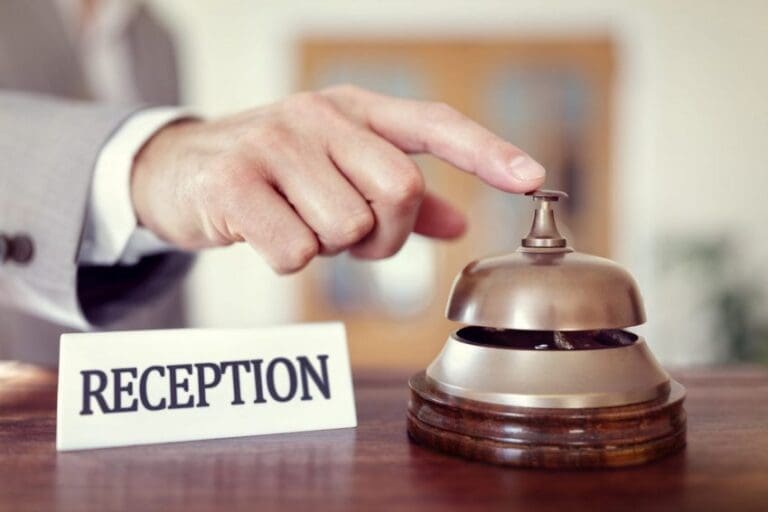Making someone feel welcome when they come through the door of your hotel is something absolutely fundamental that everyone, from your receptionist to your handyman, should know all about and execute with ease, right? Yet so many people get it so horribly wrong. Here is a quick guide on what mistakes to look out for and how to best rectify them.
 First point of contact
First point of contact
Your guests first point of contact is possibly the most important, right? What is their first point of contact, I hear you ask? Common sense would tell you that it is the reception desk, the clue is in the title I guess. But if that is your perception, then you would be wrong. Putting aside the contact via your website or booking page, or the phone call to place the booking, the first point of engaging contact is the email you send them to confirm the booking.
A good practice to implement is to make the confirmation email more than just that. If you want to make that email more engaging and personal to your guest you should use the personalisation tools available in all ESP’s (Email Service Providers). First best practice is to address it to them by name. Even if you don’t have your own servers and email system and use google or some other transactional email service, then this still applies.
Acknowledge, acknowledge, acknowledge
When a guest walks through your door, this is where the first fatal mistake is made by so many. Of course, we all realise that working on reception can be hectic at times and your attention can be pulled in a million and one different directions.
 This, however, is not a reason or excuse to ignore your guest. One of the worst mistakes I have seen happen time and again, it has happened to me too, is when the receptionist has just taken a phone call and rather than looking at you, they raise their index finger to tell you to hold on a minute. This action is not exactly wrong, however it is hugely important to accompany the gesture, or preferably just before the gesture, with eye contact and a smile. As my grandmother always said, good manners cost nothing.
This, however, is not a reason or excuse to ignore your guest. One of the worst mistakes I have seen happen time and again, it has happened to me too, is when the receptionist has just taken a phone call and rather than looking at you, they raise their index finger to tell you to hold on a minute. This action is not exactly wrong, however it is hugely important to accompany the gesture, or preferably just before the gesture, with eye contact and a smile. As my grandmother always said, good manners cost nothing.
This also applies when you answer the phone as they approach, or you are asked a question as they approach and even when you have greeted them and any of the aforementioned happens. That eye contact could be the difference between your guest leaving a good review or a bad one. By simply acknowledging your guests presence, it gives them a feeling of being wanted and welcome. Simple.
Bar and waiting staff
The attitude of the people working in your bar and restaurant actually have, in my opinion, the greatest role to play and the most influence in customer satisfaction. The same rules as the reception desk apply to bar staff. For a good start, a quick acknowledgement of the arrival of a new guest to the bar makes all the difference.
 As a bar staff member, it is essential to show interest in your guests. If you find yourself with no customers to serve and you have customers coming to the bar, then make sure you use the opportunity. Talk to them. Show interest in why they are there, how long they are staying, give them tips on places to see. This kind of attention can make your guests feel special and give them a much better customer experience. And smile. This is always important.
As a bar staff member, it is essential to show interest in your guests. If you find yourself with no customers to serve and you have customers coming to the bar, then make sure you use the opportunity. Talk to them. Show interest in why they are there, how long they are staying, give them tips on places to see. This kind of attention can make your guests feel special and give them a much better customer experience. And smile. This is always important.
If you work in the restaurant, or you want to advise your waiting staff, it couldn’t be easier. Smile and acknowledge. I know it seems like I am just repeating myself, but it is for good reason. Eye contact as soon as they walk in, smile and seat them and tell them you will be with them as soon as you can and maybe send someone to take a drinks order if you are busy.
Keep one on the floor at all times. No I don’t mean literally, I mean always keep an eye on your guests so you are instantly aware if someone is looking for your attention. If you cannot go to them at the point of recognition, then just a smile and acknowledgement will let your guest know that you have realised they need you and you will be with them at the earliest possible moment.
No matter how busy you might be, a smile takes but a split second to deliver and to acknowledge them takes even less time. It is your restaurant and bar staffs’ responsibility to show your guest that they are important so they leave with a smile of their own instead of a frown. For more info on how you can put that information across to your staff you can always read about the Elephant and the Goldfish.
Use check-out to check them out
So they have stayed in the hotel and everything has been good for them, the bar staff did their job well and the food and service was always good. But how do you know that? When your guest checks out, it is the perfect opportunity to find out how things were and possibly rectify any bad feeling they may have from their stay.
A few common-sense questions about their stay will quickly tell you if everything was OK. Of course if you ask “How was your stay?”, then you are most likely going to get the generic answer of “It was good, thank you”. Try asking leading questions like “Was there anything we could have done better during your stay?” or “What was the worst part of your stay?”. Risky perhaps, but if you really care about your guest then it is not, because if their answer contains anything about your hotel, then you know what to fix. Getting the generic answer of “good thanks” helps no one. As hoteliers and hotel workers, we cannot run away from criticism. It is what drives us towards improvement. If you are a manager and you get a complaint about a certain member of staff then remember this, it is not their fault, it is yours. You need to address the training you have given them or problems they may be having that caused them to forget their basic courtesy and focus.
If you don’t follow these rules then you will be sure to make your guest feel unwelcome, not special in any way and you can almost guarantee two things. Firstly, they will never come back for another visit. Secondly, and probably even more importantly, they will be an elephant.


















